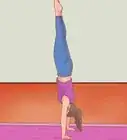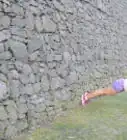This article was co-authored by Tanya Berenson. Tanya Berenson is a Gymnastics Instructor and the General Manager of the Los Angeles School of Gymnastics. With over 25 years of professional gymnastics experience, Tanya has also served as a consultant to USA Gymnastics, has served as the USA World Maccabi Games Head Coach, USA Gymnastics Meet Director, and RAS counselor. She holds a B.Ed. in Early Childhood Development from the University of California, Los Angeles.
There are 8 references cited in this article, which can be found at the bottom of the page.
This article has been viewed 491,313 times.
An aerial , or no-handed cartwheel, is an expert level gymnastics move that requires practice and patience to master. Begin your training by getting completely comfortable with regular cartwheels and one-handed cartwheels.[1] When you feel confident, move on to aerials, using a kicking motion of your legs to give you the momentum you need to propel yourself through the move. It will take practice to get the hang of it, but soon you’ll be able to wow your friends with your new trick that you worked so hard to achieve!
Steps
Executing an Aerial Cartwheel
-
1Stand with your legs a shoulder-width apart. Before starting the aerial, find your balance by standing with your legs apart and your arms at your sides. Finding your balance will help you execute the aerial more precisely. [2]
- Don’t do aerial cartwheels on a hard surface. Always do them either outside on the grass or inside on gymnastic mats.[3]
- Use a spotter who can catch you if you fall.
- Don't attempt an aerial cartwheel if you are not already proficient in regular and one-handed cartwheel as well as in other advanced gymnastics moves. If you go into doing aerial cartwheels with no prior gymnastics experience, you run a high risk of getting hurt.
-
2Take a few running steps. Running before the aerial gives you more speed and momentum, making it easier to perform the trick with no hands. Make sure your steps are even and controlled.[4]
- Once you master the aerial, you will be able to do it without running first. Running can make it easier to get the momentum you need as you are starting to learn.
Advertisement -
3Bring up your launching leg. After you have taken a few steps, bring up your launching leg, or leg that you want to launch off of for your aerial, so that it’s parallel to your chest. As you bring up your launching leg, do a small hop with your rear leg. Keep your hands away from your body, outstretched to the side and level with your shoulders. [5]
- If you are just beginning, your launching leg should be your dominant leg, which is generally stronger.
- Think of this as a wind up step which will help you generate the momentum you need for aerial.
-
4Plant your launching leg. After you hop with your rear leg, plant your launching leg into the ground. Keep the knee of your launching leg bent and bring your arms down so that they are still out but are level with your waist.[6]
-
5Kick up your rear leg. With your leading leg planted, kick off with your back leg. Your torso should now be horizontal to the ground, with your leading leg planted perpendicular to the ground and your other leg swinging up behind you.[7]
- Use your bottom leg to get the height you need. Push up off the ground with your foot. Remember, this isn’t like a normal cartwheel where you reach down. Instead, go for height to carry you through the aerial.[8]
-
6Swing both your legs over your head. Keep whipping up your rear leg, then launch off your leading leg so that both legs are above your head. Keep your hands in fists if you are tempted to reach out and grab the ground.
- If you feel like you’re going to fall on your head, put your hands down. It’s better to be safe than to risk getting hurt.
- Try to twist your torso so that it is pointed in the direction of travel, with your arms perpendicular from your torso.
- Keep looking forwards as you go through the aerial.
-
7Land onto your first leg and plant your launching leg. To finish the aerial, swing your leg between your outstretched arms and plant it on the ground. If your leg is swinging down and your arms are in its path, move your arms so you don’t kick yourself on your landing.[9]
- Touch down with your launching leg about a foot’s distance from your landing leg.
- Straighten up and use your hands to regain your balance if you need to. You’ve just finished your aerial!
-
8Use a spotter when you are just beginning. When you are just learning how to do an aerial cartwheel, make sure to always practice with someone there to spot you. Have the spotter stand behind you and over to the side in the direction that you will be doing the cartwheel.[10]
- A spotter can assist you by putting their right hand on your left hip when you are performing the aerial, and catch you when you are finished by putting their left hand on your right hip so you don't lose balance.
- A spotter can also catch you if you can't complete the aerial and topple over.
-
9Practice the aerial from a stationary starting position. When you are just starting learning how to do aerials, it’s easier to get the momentum you need by taking a few running steps. As you get comfortable doing aerials, cut out the running and get your momentum through your hop with your rear leg and an explosive take off.
Building up to an Aerial Cartwheel
-
1Practice doing regular cartwheels. Don’t skip practicing regular cartwheels and move straight on to aerials. Knowing how to Do a Cartwheel effortlessly will strengthen your sense of balance and coordination, which is essential in your training. Keep practicing until you feel like you can do a cartwheel in your sleep!
- A regular cartwheel is the foundation for an aerial cartwheel, and if you don’t feel 100% comfortable doing it, you won’t be successful in learning an aerial cartwheel.
-
2Do a one-handed cartwheel. After you have mastered the regular cartwheel, learn how to Do a One-Handed Cartwheel. A one-handed cartwheel brings you one step closer to your goal and will teach you how to momentum your energy through the cartwheel without using both of your hands.[11]
- When you practice one-handed cartwheel, switch off between your right and left hands. This will prevent you from becoming dependent on one of your hands for the stunt.
-
3Do a one-handed cartwheel and delay putting your hand down. Once you feel comfortable doing one-handed cartwheels, practice doing them and wait until the last possible moment to put down your hand as you flip.
- This will stop you from using your hand as a crutch so that you get used to the feeling of moving upside down in the air without your hands supporting you.
-
4Do dynamic stretches regularly. Dynamic stretches are extremely important if you are starting to learn aerials and other tricks. Dynamic stretches differ from regular stretches because instead of stretching and holding a position, dynamic stretches require you to stretch your muscles through a series of quick movements.[12]
- Because dynamic stretches mimic the quick motions your body goes through as you do aerials or other tricks, doing these stretches before training minimizes the chance of pulling a muscle or hurting yourself.
- Examples of dynamic stretches include leg lifts and kicks, body twists and side bends.
Expert Q&A
Did you know you can get expert answers for this article?
Unlock expert answers by supporting wikiHow
-
QuestionHow long does it take to learn an aerial?
 Tanya BerensonTanya Berenson is a Gymnastics Instructor and the General Manager of the Los Angeles School of Gymnastics. With over 25 years of professional gymnastics experience, Tanya has also served as a consultant to USA Gymnastics, has served as the USA World Maccabi Games Head Coach, USA Gymnastics Meet Director, and RAS counselor. She holds a B.Ed. in Early Childhood Development from the University of California, Los Angeles.
Tanya BerensonTanya Berenson is a Gymnastics Instructor and the General Manager of the Los Angeles School of Gymnastics. With over 25 years of professional gymnastics experience, Tanya has also served as a consultant to USA Gymnastics, has served as the USA World Maccabi Games Head Coach, USA Gymnastics Meet Director, and RAS counselor. She holds a B.Ed. in Early Childhood Development from the University of California, Los Angeles.
Gymnastics Instructor
-
QuestionWhat is you biggest tip for doing an aerial?
 Community AnswerWhen you are running to do your aerial, stay upright. If you lean down as you approach you aerial, then you wont get very much height. So jump up and forward, not down and forward.
Community AnswerWhen you are running to do your aerial, stay upright. If you lean down as you approach you aerial, then you wont get very much height. So jump up and forward, not down and forward. -
QuestionHow do I remember to not be scared?
 Community AnswerIt's natural to be a little bit scared of flipping yourself upside down in the air! A good way to quiet your fears is to remember that you can always put your hands down. Removing the pressure of having to perform the aerial perfectly and knowing that you always have a "safety net" should make you feel better.
Community AnswerIt's natural to be a little bit scared of flipping yourself upside down in the air! A good way to quiet your fears is to remember that you can always put your hands down. Removing the pressure of having to perform the aerial perfectly and knowing that you always have a "safety net" should make you feel better.
Warnings
- Always do aerials on the grass or on a padded mat. Falling on a hard surface can cause injury.⧼thumbs_response⧽
- Use your hands to shield your fall if you are worried about falling on your neck or head.⧼thumbs_response⧽
- Do not try to do your aerial without running until you have mastered it.⧼thumbs_response⧽
- Practice the steps of going into a aerial with a one handed cartwheel⧼thumbs_response⧽
References
- ↑ Tanya Berenson. Gymnastics Instructor. Expert Interview. 22 May 2020.
- ↑ http://anthonymychal.com/aerial/
- ↑ http://www.drillsandskills.com/article/10
- ↑ http://anthonymychal.com/aerial/
- ↑ http://anthonymychal.com/aerial/
- ↑ http://anthonymychal.com/aerial/
- ↑ http://anthonymychal.com/aerial/
- ↑ Rosalind Lutsky. Former Gymnastics Coach. Expert Interview. 30 December 2018.
- ↑ http://anthonymychal.com/aerial/
About This Article
To do an aerial cartwheel, take a couple of running steps, then bring up your launching leg. Do a little hop with your rear leg, then plant the forward leg firmly on the ground. Next, kick your rear leg up behind you, immediately followed by your other leg. Swing both legs over your head before planting them both firmly on the ground. When both of your feet are on the ground again, straighten up to regain your balance. To learn more from our Gymnastic Coach co-author, like how to practice by doing one-handed cartwheels, keep reading!



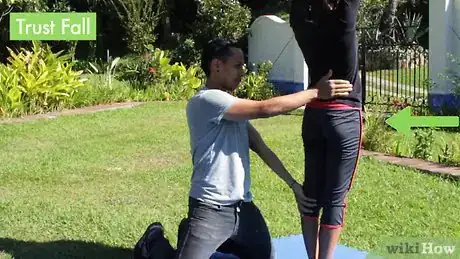
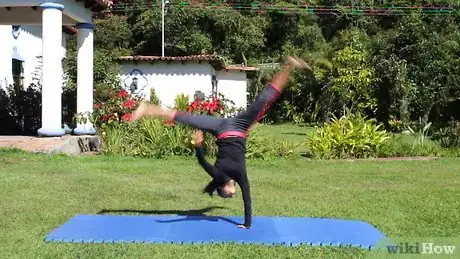
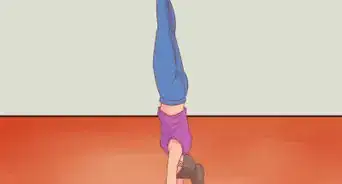
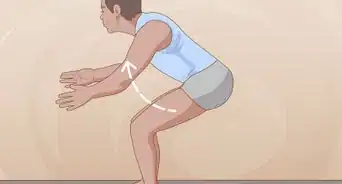



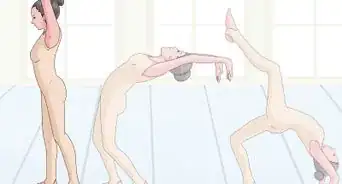

-Step-6-Version-4.webp)










